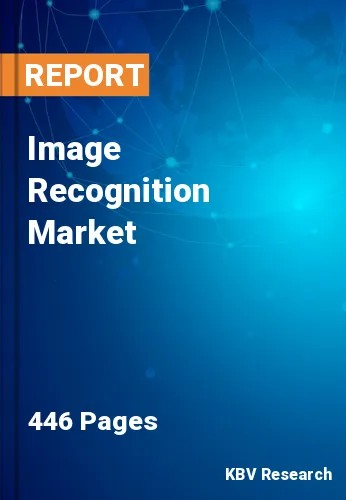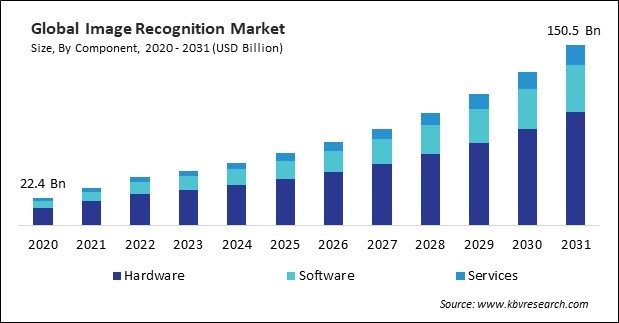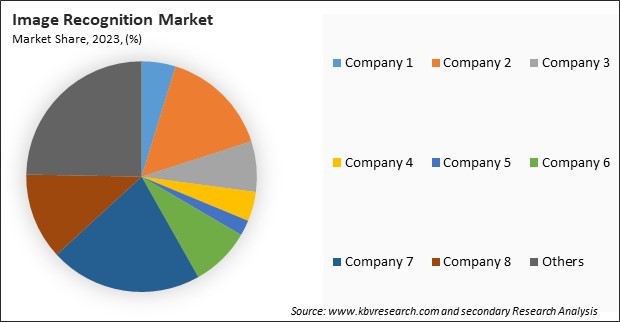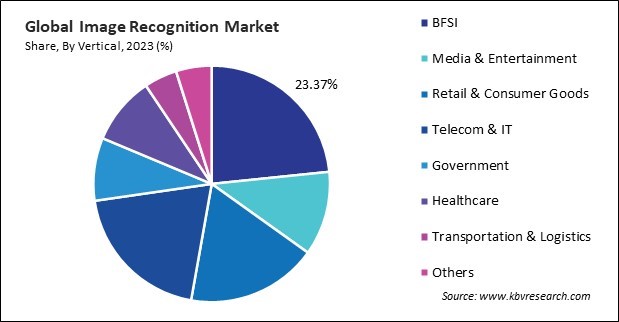
“Global Image Recognition Market to reach a market value of USD 150.5 Billion by 2031 growing at a CAGR of 16.3%”
The Global Image Recognition Market size is expected to reach $150.5 billion by 2031, rising at a market growth of 16.3% CAGR during the forecast period.
Facial recognition technology is increasingly adopted for security and surveillance, consumer electronics, and personal identification. This technology's use in smartphones, at airports for security checks, and by law enforcement agencies to identify individuals illustrates its wide-ranging applications. Consequently, the Facial Recognition segment would acquire nearly 16.8% market share by 2031. The increasing concern for security and personal verification solutions, along with advancements in AI, have driven the adoption and market growth of facial recognition technology.

This recognition is among the numerous technological domains that have been transformed by advancements in artificial intelligence (AI) and machine learning. In security, deep learning has greatly benefited facial recognition technologies. Systems can now identify individuals with greater precision in various lighting conditions and angles, enhancing security measures in public spaces and airports. Hence, these advancements will aid in the growth of the market. Additionally, The generation and utilization of digital imagery have been significantly influenced by the proliferation of digital devices, including tablets, smartphones, and other devices that are equipped with high-resolution cameras. Moreover, the demand for advanced image processing solutions is driven by the need to manage and make sense of this vast data. Thus, the proliferation of digital devices with advanced imaging capabilities is aiding in the development of the market.
However, Implementing advanced recognition systems involves considerable costs that can be daunting, especially for smaller businesses or startups. Maintenance and ongoing development further add to the costs. These recognition technologies are not static; they require continuous updates and improvements to stay effective. Hence, the substantial cost of this recognition may impede their adoption.

The leading players in the market are competing with diverse innovative offerings to remain competitive in the market. The above illustration shows the percentage of revenue shared by some of the leading companies in the market. The leading players of the market are adopting various strategies in order to cater demand coming from the different industries. The key developmental strategies in the market are Acquisitions, and Partnerships & Collaborations.
Based on deployment mode, the market is segmented into cloud and on-premise. The on-premise segment recorded 34% revenue share in the market in 2023. Sectors like government, healthcare, and banking might prefer on-premise solutions to adhere to stringent data protection regulations, ensuring that sensitive information does not leave the physical premises. On-premise solutions also offer better customization to specific requirements, which is critical in settings where very specialized recognition functions are needed.
By vertical, the market is divided into BFSI, media & entertainment, retail & consumer goods, telecom & IT, government, healthcare, transportation & logistics, and others. The telecom & IT segment witnessed 20% revenue share in the market in 2023. Telecom companies increasingly use this recognition technologies to monitor and maintain infrastructure. For example, this recognition can help identify and diagnose issues in vast networks of cables, towers, and other equipment, reducing downtime and optimizing service delivery.

Based on component, the market is characterized into hardware, software, and services. The software segment procured 25.2% revenue share in the market in 2023. This segment covers the algorithms and computational models that process and analyze images. Given the increasing sophistication of machine learning and AI technologies, software is pivotal in expanding the capabilities of these recognition systems.
On the basis of application, the market is classified into scanning & imaging, security & surveillance, image search, marketing & advertising, and others. The security & surveillance segment acquired 25% revenue share in the market in 2023. This recognition technologies are integral in enhancing security measures, with applications ranging from monitoring public spaces and managing crowd control to sophisticated systems for detecting unauthorized access or identifying criminal activities.
On the basis of technology, the market is divided into code recognition, digital image processing, facial recognition, object recognition, pattern recognition, and others. The digital image processing segment garnered 21% revenue share in the market in 2023. This segment involves techniques to enhance image quality and extract useful information from digital images using various algorithms and systems. Its applications span sectors such as healthcare, medical imaging analysis, automotive, enhancing and processing images from vehicle cameras, and surveillance, where image quality and clarity are crucial.
Free Valuable Insights: Global Image Recognition Market size to reach USD 150.5 Billion by 2031
Region-wise, the market is analyzed across North America, Europe, Asia Pacific, and LAMEA. The North American segment acquired 41% revenue share in the market in 2023. North America, particularly the United States and Canada, has a robust technological infrastructure and hosts many leading technology companies that are pioneers in AI and these recognition technologies, such as Google, Microsoft, and IBM.
| Report Attribute | Details |
|---|---|
| Market size value in 2023 | USD 45.6 Billion |
| Market size forecast in 2031 | USD 150.5 Billion |
| Base Year | 2023 |
| Historical Period | 2020 to 2022 |
| Forecast Period | 2024 to 2031 |
| Revenue Growth Rate | CAGR of 16.3% from 2024 to 2031 |
| Number of Pages | 446 |
| Number of Tables | 790 |
| Report coverage | Market Trends, Revenue Estimation and Forecast, Segmentation Analysis, Regional and Country Breakdown, Market Share Analysis, Porter’s 5 Forces Analysis, Company Profiling, Companies Strategic Developments, SWOT Analysis, Winning Imperatives |
| Segments covered | Component, Deployment Mode, Application, Technology, Vertical, Region |
| Country scope |
|
| Companies Included | Hitachi, Ltd., Microsoft Corporation, NEC Corporation, Thales Group S.A., 3M Company, Cognitec Systems GmbH (Salto Systems, S.L.), IBM Corporation, Onfido Limited (Entrust Corporation), Qualcomm Incorporated (Qualcomm Technologies, Inc.) and Google LLC (Alphabet Inc.) |
By Deployment Mode
By Vertical
By Component
By Application
By Technology
By Geography
This Market size is expected to reach $150.5 billion by 2031.
Advancements in AI and machine learning are driving the Market in coming years, however, High Costs of Implementation restraints the growth of the Market.
Hitachi, Ltd., Microsoft Corporation, NEC Corporation, Thales Group S.A., 3M Company, Cognitec Systems GmbH (Salto Systems, S.L.), IBM Corporation, Onfido Limited (Entrust Corporation), Qualcomm Incorporated (Qualcomm Technologies, Inc.) and Google LLC (Alphabet Inc.)
The expected CAGR of this Market is 16.3% from 2023 to 2031.
The BFSI segment is generating the highest revenue in the Global Image Recognition Market by Vertical in 2023; thereby, achieving a market value of $30 billion by 2031.
The North America region dominated the Market by Region in 2023, and would continue to be a dominant market till 2031; thereby, achieving a market value of $58 billion by 2031.
Our team of dedicated experts can provide you with attractive expansion opportunities for your business.
 Drivers
Drivers
 Restraints
Restraints
 Opportunities
Opportunities
 Challenges
Challenges
